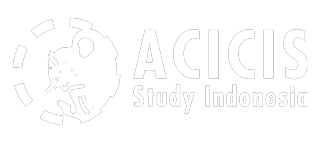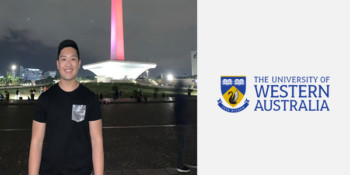Eric Wong is a New Colombo Plan Mobility Grant recipient from the University of Western Australia. Eric undertook the Public Health Study Tour in November 2019.
Q: Why did you decide to undertake the ACICIS’ Public Health Study Tour?
My passion for volunteering and people had driven me to pursue the Public Health Study Tour. I wish to continue these passions in developing countries as I begin my journey as a dental practitioner in the near future. One of the main challenges I had faced during my time in volunteering is that different cultures have different perceptions of medicine. The way in which you communicate, educate and apply treatment would mostly likely be unique and changed in some aspect to fit different cultures. Hence, I decided to undertake the program in order to further my knowledge and experience in intercultural management of medicine as Indonesia’s population consists of 300 different native languages, 300 ethnic groups and 260 million people scattered across 17,000 islands.
Q: Did you receive a New Colombo Plan Mobility Grant? If so, how did this contribute to your experience in Indonesia?
I was fortunate enough to receive the New Colombo Plan Mobility Grant as part of my participation of the PHST program offered by ACICIS. The grant had allowed me to focus on my course work, fully embrace my experiences during field trips, cultural visits and fully immerse in Indonesia’s rich culture without having to worry about my finances throughout the trip.
Q: What did you find to be the most challenging about your experience on the PHST?
During the programs, we had the opportunity to present on specific areas of public health including the challenges and the provision of ideas and strategies. We were fortunate enough to collaborate with two students from Universitas Indonesia. However, it was one of the more challenging aspects of the tour due to the difference in cultural backgrounds. If I scale this up for a moment, collaboration between nations is key in overcoming struggles and challenges in any context. Having to work with the local students was a pleasure, they provided enriching and unique ideas and perspectives on our topic but coordinating our efforts in a cohesive manner as a group was a challenge, I continuously faced during the period of preparing and presenting group presentations. I have learned a lot from the local students and have gained many skills such as leadership and teamworking skills which has aided my group and I to present our ideas cohesively and in a manner in which satisfies all parties. This experience is completely different and unique to what I usually experience back home and has given me the knowledge and experience in order to improve group cohesion, direction and discussion.
Q: What public health issues in Indonesia have you become more interested in/aware of as a result of this tour?
We have always been taught from young that smoking should be avoided at all costs due to its long-term impact on the quality of life on individuals. In Indonesia, more than 34% of the population smoke which even include children. Smoking presents many challenges to public health and the complexity of disbanding smoking in a political and economic framework is an issue that still impacts the health and wellbeing of the population.
Q: What was your favourite field trip?
Our visit to YAKKUM Rehabilitation centre in Yogyakarta was one of my favourite trips in the program. During my visit, I was able to learn about the outlook on and the stigma surrounding the mentally challenged/disabled people of the country. The many challenges they face including employment, social exclusion and educational opportunities available would have seemed somewhat non-impactful in a classroom setting. The opportunity to hear from one of the leaders of the centre played a key and powerful role in my understanding and perception of the issues faced. Regardless of this, I was happy to see small steps being taken towards these challenges and although they face these struggles constantly, it doesn’t stop their personal and individual progression. Their Café, Cupable, is an excellent example of this, how it encourages people living with disability to have hope and purpose by simply learning how to make a good cup of coffee.
Q: How do you think the Public Health Study Tour will influence your future career or studies?
Having had the opportunity to undertake the program, it has reassured my decision in studying and partaking in health and medicine. The program has allowed to me to gain and apply key skills such as leadership and teamworking in a surreal setting, further my knowledge and experience of intercultural management and cultural sensitivity and how it is key in navigating through different cultures when practicing health and medicine all in which will help me in my future profession.
Q: What did you most enjoy about the seminar series?
Having had the opportunity to hear from health representatives from different cultural, religious and educational background has provided me an unforgettable insight into the challenges Indonesia’s healthcare system currently faces. Their differing knowledge and expertise have enriched my understanding and has changed my outlook and perspective on the issues faced by the country as they frame different challenges through different contexts.
Q: What was your favourite aspect about visiting Indonesia?
Throughout the trip, we had student buddies, program coordinators and assistants that come from differing educational and cultural backgrounds. As I reflect back on the program, I have been able to make many new friends as a result of this. Not only did I have the opportunity to meet new people in a foreign country, but I also got to know them whom I now call as friends. These new friends of mine have enriched my experience of this program, whether it’d be the cultural visits, the different seminars presenting different challenges to public health or even out of class getaways for sightseeing, food and exploration. They have made my visit to Indonesia even more memorable including the people of Yogyakarta whom are always happy and smiling.


